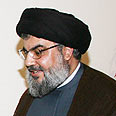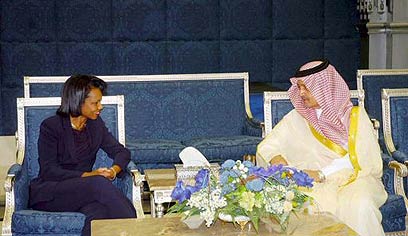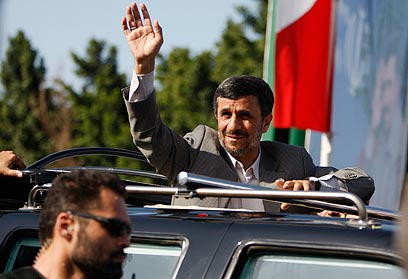
Saudi plan for anti-Hezbollah force revealed
Leaked US diplomatic cable says Saudi Arabia proposed setting up Arab force to fight Shiite militants in Lebanon with help of US, UN and NATO, fearing that a Hezbollah victory against Lebanese gov't would eventually lead to Iran's takeover of country
Saudi Arabia proposed setting up an Arab force to fight Hezbollah militants in Lebanon with the help of the United States, UN and NATO, a leaked US diplomatic cable said Tuesday.
In a meeting in May 2008 with US ambassador to Iraq David Satterfield, Saudi Foreign Minister Saud al-Faisal said a "security response" was needed to the "military challenge" posed to Beirut by the Iran-backed militants.
The Saudi prince feared a Hezbollah victory against the Lebanese government led by then-Prime Minister Fouad Siniora would eventually lead to Iran's takeover of the country.
There was a need for an "Arab force" to create and maintain order in and around Beirut, he argued, saying the Lebanese army was "too fragile to bear more pressure," according to the cable from the US embassy in Riyadh, one of the latest to be released by the website WikiLeaks.
Such a force would be aided by UNIFIL troops deployed in southern Lebanon, while the "US and NATO would need to provide movement and logistic support, as well as naval and air cover," the cable added.
But the plan would likely have triggered alarm in Washington, proposing a return for US troops to Lebanon for the first time since the 1983 suicide bombing of a US Marine barracks in Beirut which killed almost 300 people.

Saudi FM Saud al-Faisal with then-US Secretery of State Rice (Photo: AFP)
Saud argued that "of all the regional fronts on which Iran was now advancing, the battle in Lebanon to secure peace would be an easier battle to win."
He told Satterfield that Siniora strongly supported the plan but that only Jordan, Egypt and the Arab League were aware of it.
What was needed was an "Arab force" drawn from Arab "periphery" states to deploy to Beirut under the "cover of the UN," Saud said, accusing the UN troops in southern Lebanon of "sitting doing nothing."
But Satterfield said there were real questions about the "political and military" feasibility of such a scheme, and winning a new mandate for UNIFIL would difficult.
A US diplomatic memo released earlier by WikiLeaks showed Saudi Arabia is obsessed by what it sees as a threat from Iran, fearing Tehran's alleged ambition to spread Shiite Islam.
Underlying the rivalry is a deep Shiite-Sunni schism. Saudi Arabia is predominantly Sunni, and minority Shiites face regular condemnation by officials as having rejected "true" Islam.
Iran, meanwhile, is predominantly Shiite.
Iran feared Hezbollah would target Syria
According to another secret memo, the assassination of senior Hezbollah commander Imad Mugniyah triggered an exchange of accusations within the Syrian intelligence and sparked tensions between Iran, Hezbollah and Damascus.
British newspaper the Guardian reported Tuesday night that Syrian officials were stunned by the mysterious assassination in Damascus two years ago, which the Shiite organization blamed Israel for and vowed to avenge.
According to American documents from February 2008, this led to a blame game between rival security services in Syria.

Patron suspected Syria. Iranian leader in Lebanon (Photo: Reuters)
"Syrian military intelligence and general intelligence directorate officials are currently engaged in an internecine struggle to blame each other for the breach of security that resulted in Mugniyah's death," the US Embassy reported.
Saudi Arabia's Ambassador to Lebanon Abdel Aziz Khoja told US diplomats in Beirut that Hezbollah believed the Syrians were responsible for the Damascus killing.
According to the Guardian, no Syrian official was present at Mugniyah's funeral in Beirut's southern suburbs the following day. Iran was represented by its foreign minister, who, the Saudi envoy said, had come to calm down Hezbollah and keep it from taking action against Syria.
Khoja said that another rumor was that Syria and Israel had made a deal to allow Mugniyah to be killed. US diplomats reported that the killing led to tensions between Syria and Iran, perhaps because Tehran shared Khoja's suspicion of Syrian complicity in the affair.
These reports come in the midst of high tensions in Lebanon ahead of indictments expected to be issued by an international tribunal against Hezbollah over the murder of former Lebanese Prime Minister Rafik Hariri. The Shiite organization has threatened to take over Lebanon if charged with the assassination.
- Follow Ynetnews on Facebook










